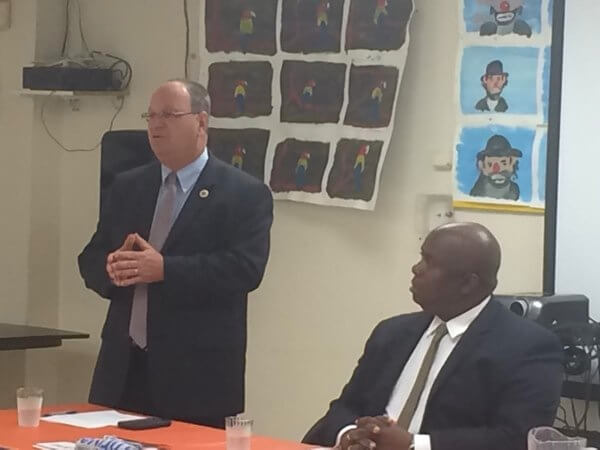By Mark Hallum
To address the need for better mental health services throughout the city, Deputy Mayor Richard Buery, Mental Health Commissioner Gary Belkin and Councilman Barry Grodenchik (D-Oakland Gardens) held a forum to discuss the ThriveNYC program and how community organizations can help support the nearly one in five New Yorkers experiencing psychological trouble.
The Monday forum, hosted by Samuel Field Y at 58-20 Little Neck Parkway, informed listeners about what the program aims to do, attitudes toward mental health assistance that need to be changed and how organizations can get involved.
According to the city website, ThriveNYC is a health plan which will train 250,000 employees and shift the perception of mental illness from an issue which is misunderstood and stigmatized to an aspect of life New Yorkers can easily seek help for..
Some aspects of the ThriveNYC program are already in the works. According to Buery, hiring for a hotline has already taken place with language diversity in mind. About 100 mental health professionals have also been hired and each will be assigned to 10 schools where they will advise staff on how to build a healthy psychological environment for students.
Grodenchik led the conversation by explaining how mental illness had affected his family, causing one member to commit suicide. He spoke of the dangers posed by the stigma of mental illness and how it prevents people from seeking treatment or support.
“We see this as a problem that affects every aspect of our lives and every community,” Belkin said, and explained how different cultures face mental health crises. The white population, for example, suffers the least and is statistically less likely to take their own lives compared to black and Asian demographics. Suicide is the top 10 leading cause of death for Asian-American men, according to Belkin.
Buery said cultural barriers must be deconstructed so people can feel open to the treatment they may need. ThriveNYC will focus on investing in children and introduce them to the program early on. He explained that issues like depression should be treated with the same attitude as a broken leg; without shame, and without barriers.
Jeri Mendolsohn, executive vice president and CEO of Samuel Field Y, said the systems created for community outreach are often too complicated to accomplish their goals. A city program partnering with the cultural aspects that can only be found with community organizations is one way she sees the ThriveNYC working successfully within the diverse facets of Queens, but stressed the importance of simplicity between the city and groups.
Representatives from Korean Community Services and India Home also offered input from their experience serving their communities needs and expectations from people within their cultural group.
Reach reporter Mark Hallum by e-mail at mhall


































